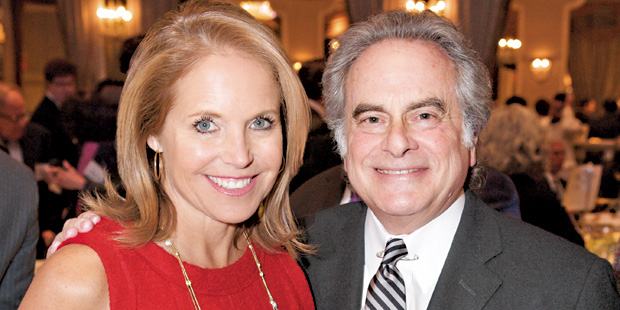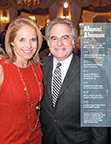In the Eye of the Media Tsunami
Printer Friendly VersionCriminal defense lawyer Benjamin Brafman (LL.M. ’79) has tackled some of the highest-profile cases of the last three decades, defending luminaries such as Sean Combs, Jay-Z, and Plaxico Burress. More often than not, his untiring efforts result in acquittals. Last year, he defended Dominique Strauss-Kahn (DSK), the presumptive candidate for France’s presidency, against explosive sexual assault charges but ultimately saw the Manhattan District Attorney’s Office drop the charges as its case began to unravel.
Brafman spoke about his DSK experiences and handling media pressure to an audience of more than 400 attending the Annual Alumni Luncheon at the Pierre Hotel on January 20. During the business portion of the luncheon preceding Brafman’s talk, outgoing Law Alumni Association president Emily Campbell ’95 introduced the new president-elect, Rocco Andriola ’82 (ll .m. ’86), who expressed eagerness to accept his new role. Campbell received a citation from Vice Dean Jeannie Forrest expressing the Law School’s deep appreciation for her service.
Neil Barofsky ’95, senior fellow at the Center on the Administration of Criminal Law and former special inspector general of the Troubled Asset Relief Program, introduced “When the Media and the Criminal Justice System Collide,” Brafman’s keynote address. “If you get in trouble, there is no better advocate in the world to have on your side than Ben Brafman,” Barofsky said. The principal of Brafman & Associates, Brafman first honed his quick thinking as a stand-up comic while working his way through college, then as an assistant district attorney for the very office that would drop the DSK charges decades later.
The DSK case landed Brafman and his client on front pages all over the globe. “I am on a world stage with no script, dancing as fast as I can,” he said. “When I’m right I’m a hero, and when I’m wrong I’m a jerk. And it’s the same talent, it’s the same skill, it’s the same effort. You win, it’s good. You lose, someone’s life is over. And I mean over…. You have to maintain your focus. And like a tsunami, you have to hold on very tight to something that’s grounded and wait until the wave passes and hope you’re still standing.”
Such experiences don’t leave Brafman feeling bitter toward the press. “I like the media,” he said to an audience that included journalists Katie Couric and Jeffrey Toobin, both his invited guests. “But the press has a great deal of protection…. If I am a public figure in the crosshairs of the media, anything you want to say about me is essentially fair game.”
Brafman acknowledged that the blame for media frenzies is a shared one. He characterized the DSK case, for example, as vastly overhyped: “The priorities of the media have to be carefully looked at…yet it’s not the media that’s at fault. It’s us. We were junkies. We needed to have more and more and more material and information about something that really wasn’t—in my opinion, anyway—that interesting.”
—

